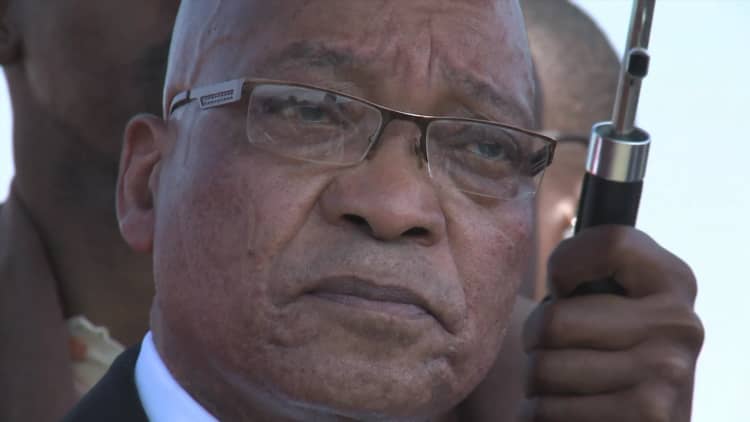South African President Jacob Zuma has addressed calls by his ruling African National Congress (ANC) party for his resignation as "unfair."
"There's nothing I've done wrong," Zuma said, speaking on state television Wednesday, adding that he thought that the party was being plunged into a crisis its members would regret. "I'm being victimized," he said.
Zuma is due to make a statement later on Wednesday.
The ANC said earlier Wednesday that it would back a fast-tracked no-confidence motion against the president in parliament Thursday, raised by an opposition party.
This was the most recent in a series of blows that ANC has dealt to Zuma in an attempt to shake itself free from his scandal-laden government. The ANC called for his removal from office on Tuesday, although the party did not specify a time frame for him to leave.
Markets reacted swiftly to the news, with the South African rand hitting a 2.5-year high against the U.S. dollar on Wednesday. The U.S. currency sank in relation to the rand by 2 percent at approximately 11:40 a.m. ET Wednesday. Johannesburg's Top 40 index was trading 0.3 percent higher.
Zuma was replaced by Ramaphosa as head of the ANC in December. Ramaphosa is a former trade union leader-turned-politician and one of South Africa's richest men.

Since Ramaphosa's election to ANC leader, signals had been getting stronger that time was up for Zuma's presidency. Last week, South Africa's annual State of the Nation address, to be given by the president, was canceled just days before it was scheduled to take place.
Ramaphosa is viewed as business-friendly, not least because he is expected to crack down on the graft that has plagued Zuma's administration. It is hoped that he will lift South Africa — part of the Goldman Sachs-labeled BRICS group of promising emerging market economies that ranks it alongside Brazil, Russia, India and China — out of the economic doldrums it has struggled with in recent years.
Beset by allegations
According to the International Monetary Fund (IMF), real gross domestic product growth for South Africa was just 0.7 percent in 2017, well below the 4.6 percent of emerging market economies as a whole.
Zuma has survived previous votes of no confidence in the South African parliament, the last being in August 2017.
Zuma's nine-year tenure as president had been beset by allegations of corruption, in particular concerning his links to the Gupta brothers, Indian-born businessmen in South Africa. Both parties deny wrongdoing, although some believe that the timing of Zuma's departure was based on him securing an exit deal that would keep him from prison.
Reuters reported Wednesday that the home of the Gupta family in Johannesburg had been raided by police in the early hours as part of an investigation into graft, with three people arrested.

But, Zuma is supported by a faction of the ANC and Ramaphosa faces the additional task of uniting his party ahead of presidential elections next year. The ANC, the party associated with late former President Nelson Mandela, has dominated post-apartheid politics in South Africa though its popularity has fallen in recent years.
Too much optimism?
The South African rand might have strengthened since Ramaphosa was elected as ANC leader, but BofA Merrill Lynch Global Research said in a note last week that too much optimism had been priced in to South African assets.
Zuma's departure does not necessarily equal a clean state for South Africa. "Let's remember that Jacob Zuma didn't invent corruption in South Africa, it was already a big problem even before he took power, although it certainly got worse during his presidency," Ben Payton, head of Africa research at risk consultancy Verisk Maplecroft, told CNBC Tuesday.
"One thing that's important to keep in mind is the strength of South African civil society and the judiciary in actually holding Zuma and his allies to account. That doesn't really happen anywhere else to the same degree in sub-Saharan Africa," he added.

